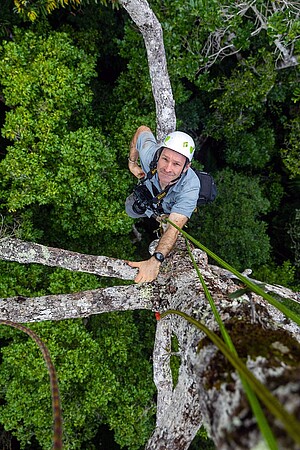A sinking boat, a leech stuck in his eye, a 4x4 caught in the mud, expeditions in the tropical forest and its particularly welcoming fauna….. when he is not at work at the Institute of Cellular and Integrative Neuroscience (INCI – CNRS/University of Strasbourg), Sylvain Hugel is off on his adventures tracking singing insects. Let’s discover this scientist who is passionate about his research and who has identified over a hundred new species.
As far back as he can remember, Sylvain Hugel has been passionate about singing insects such as locusts, grasshoppers and other types of crickets, but he has never been able to choose between this pursuit and his work as a neurobiologist. For the last 30 years, he has made the most of his nights, holidays and weekends searching for new specimens, and especially in tropical forests.
Insect songs are wonderful, even at night, when everything is dark and you are walking in a forest, you know they’re there,
says Sylvain Hugel, who is able to identify to which species an insect belongs just by their song.
“A large number of insects collected were unknown”
I have no qualifications in zoology, but it is an area that can be adapted to amateur practice
, adds Hugel, who started his investigations on his own. Whilst visiting family on the island of La Réunion, I realised that a large number of insects collected over there were unknown. Out of 10 species, only one or two already had a name.
Whether it be on the islands in the Indian Ocean, the Pacific, or Central America – his field of observation has expanded over the years.
To identify species that he detected with the help of microphones and other cameras, Hugel tours the great museums of France. After having visited them over time, I have received invitations to work with them and have been invited to take part in certain missions.
Of which none ever pan out as expected, he adds.
A unique grasshopper pollinates a rare orchid
A favourite insect? I’ve got lots,
says Sylvain Hugel with a smile, whose great discovery is a small cricket that exists only over a few square metres on the island of Rodrigues in the Indian Ocean. Or else a unique grasshopper that pollinates a rare orchid found on the island of La Réunion and whose activity has been revealed thanks to night vision cameras.
By counting the number of species still to be discovered, 85 to 99% of life forms on earth are insects
During his travels, Hugel is confronted with the rarefication of insects. For example, I described a species found in a forest in Madagascar that burnt down two years later…
, but he remains optimistic.
It is not necessarily a global anomaly. This downward trend seems especially linked to local factors such as the destruction of habitats, artificialisation, pesticides, light…. As soon as man lets nature take over again, the species return, even in a degraded zone. Natural habitats can be enormously resilient, mainly due to the biodiversity that makes them up,
concludes Sylvain Hugel who has just returned from a mission in Madagascar and where he intends to return not later than January 2023.
Marion Riegert
Good to know
New neuroscience research on insects
As a specialist in the synaptic transcription of vertebrates at INCI, Sylvain Hugel has managed to combine his two scientific lives via new neuroscience research on insects. He is thus studying the evolution of neural networks within the disparity of species among singing insects.
“I have noticed that crickets from two morphologically identical populations, and very close genetically, distinguished themselves by their songs: one was characterised by two beeps, the other by three.” Sylvain Hugel has shown that the females only answered songs of males from their own population, and that these two populations were in the process of separating into two distinct species.
With funding received from USIAS, he is currently studying the neural networks that have evolved in different ways within the two populations, and which enable females to recognise the different songs of their males.
This article was originally published in French: Sur les traces des insectes chanteurs.
















